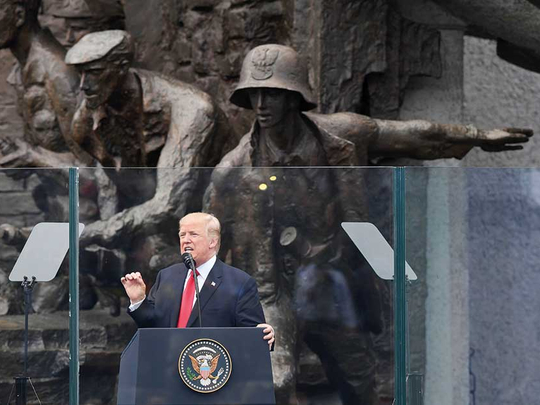
Warsaw, Poland: On the eve of his first meeting with Russian President Vladimir Putin, President Donald Trump vowed Thursday to confront “new forms of aggression” targeting the West and called for Moscow to stop fomenting unrest around the world. Yet he pointedly stopped short of condemning Russia for meddling in the US election.
Buoyed by an electrified crowd in Poland chanting his name, Trump sought to show he wasn’t overlooking Russian actions that have elicited global consternation, especially from nearby nations in eastern and central Europe. He warned that Western interests were being tested by “propaganda, financial crimes and cyber warfare,” forcing Nato to adapt.
“We urge Russia to cease its destabilising activities in Ukraine and elsewhere, and its support for hostile regimes including Syria and Iran, and to join the community of responsible nations in our fight against common enemies and in defence of civilisation itself,” Trump said in a speech in Warsaw’s Krasinski Square.
It was a critique that the president did not appear to extend to Russia’s actions last year during the presidential campaign. In a news conference before his speech, Trump questioned the veracity of American intelligence about foreign meddling in the US election, arguing that Russia wasn’t the only country that may have interfered.
“Nobody really knows for sure,” Trump said.
Opening his second overseas trip as president, he also stated unequivocally that the US stands “firmly behind Article 5,” the Nato provision requiring the US to defend other member nations if they come under attack. On his inaugural trip to Europe in May, Trump declined to affirm that commitment, to the dismay of US allies who said it cast doubt on his allegiance to the alliance.
As US investigations into Russia’s meddling forge ahead, Trump is under intense scrutiny for how he handles his first face-to-face session with Putin. US intelligence officials say the unpredictable Russia leader ordered interference into the 2016 election that brought Trump to the White House.
Trump and Putin plan to sit down on Friday in Hamburg, Germany, on the sidelines of an international summit. Asked specifically whether he planned to discuss election meddling with Putin, Trump demurred.
Loath to cast a shadow on his election victory, Trump has avoided firmly blaming Moscow for campaign hacking in the past, and on Thursday, he was similarly elusive. He argued variably that it could have been Russia, probably was Russia and indeed was Russia, while insisting it could have been other countries, too, and adding: “I won’t be specific.”
The president sought to redirect scrutiny toward his predecessor, Barack Obama, accusing him of allowing Moscow to meddle on his watch. Though the Obama administration warned Russia publicly and privately before Election Day to stop interfering, questions have since been raised about whether he acted aggressively enough to stop the threat.
“They say he choked. Well, I don’t think he choked,” Trump said. “I think he thought Hillary Clinton was going to win the election, and he said, ‘Let’s not do anything about it.’”
Using information collected by the FBI, CIA and National Security Agency, the US national intelligence director last year concluded that Moscow was behind the hack of Democratic Party email systems and attempted to influence the 2016 election to benefit Trump. The Obama administration said the effort was directed from the “highest levels” of Russia’s government — a reference to Putin.
“Mistakes have been made” by US intelligence, said Trump, issuing a reminder that America’s spy agencies had once been confident that Iraq had weapons of mass destruction, creating “one big mess” in the form of the Iraq War. Though Trump has made similar statements before, it was an extraordinary public expression of doubt about US intelligence capabilities by a president while standing on foreign soil.












